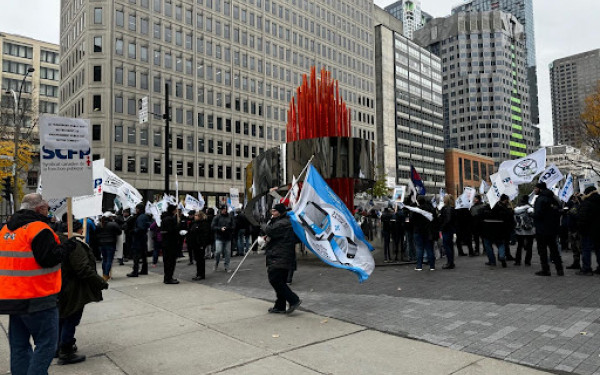Transit cuts raise concerns amongst Montrealers
STM is considering service reductions due to financial shortcomings
Monica Jackiewicz wraps up her 12-hour night shift at the hospital, exiting around 7:30 a.m., thoroughly drained. The metro has been her reliable mode of commuting home, but she’s now learning that on weekends, it might be off-limits for her until 9 a.m.
On Oct. 30, the Société de Transport de Montréal's (STM) director general Marie-Claude Léonard confirmed a contingency plan in light of budgetary challenges. This plan entails substantial service cutbacks which include the metro closing at 11 p.m. every day and resuming operations at 9 a.m. on weekends in addition to reducing the frequency of bus services.
Léonard further clarified that these are merely proposals, and they do not intend to implement such measures unless deemed necessary.
Jackiewicz expressed concern that these cutbacks would force her to resign from her job, given her current work schedule, which includes day shifts starting at 6:30 a.m. and night shifts that typically finish around 7:30 a.m.
According to Jackiewicz, there was a lack of consideration for the broader societal benefits that the metro provides.“If it's keeping hospitals open, isn't that a benefit worth considering?”
With fewer services available, additional time will be added to Jackiewicz’s commute. She mentioned that this would leave her with insufficient time between her shifts, making it unsustainable.
As budget deadlines approach, Quebec Transport Minister Geneviève Guilbault has decided to allocate $265 million out of the requested $424 million by the Autorité Régionale de Transport Métropolitain in additional funding for 2024. This remains a notable advancement in light of their initial commitment to cover only 20 per cent of the budget.
Guilbault said she believes that budget adjustments can still be made without resorting to significant service reductions.
While the STM’s contingency plan is still under consideration, the disclosure has prompted inquiries and concerns within the affected communities as they contemplate the potential repercussions of such a change.
“I already thought 12:30 a.m. was early compared to the Toronto metro,” said Dalena Nguyen, a student from Ontario attending Concordia University. The metro serves as her sole means of transportation during her studies. She described the 11 p.m. metro closure as feeling like a curfew. In contrast, The Toronto Transit Commission closes approximately at 2 a.m. daily.
Nguyen’s weekly schedule would not be affected, yet most of her exams have been on weekends. Though the bus might be an additional option, her 15-minute commute would grow closer to an hour. “I don’t really like buses because I find them not very accurate to the time. I’m always worried I’ll be late for the bus,” Nguyen said.
In a recent press conference, Montreal Mayor Valérie Plante emphasized the cultural, economic, and environmental significance of the STM, stating, “The government needs to continue to show their enthusiasm to support public transit.”
While Montrealers advocate for transit as an essential service, market fluctuations and such alterations make it challenging to rely on. Earlier this year, STM users also experienced fare hikes–an increase of approximately 3 per cent.
STM Chairman Éric Alan Caldwell highlighted the direct relationship between service cutbacks and ridership at a talk organized by the Chamber of Commerce of Metropolitan Montreal on Oct. 30. He demonstrated that from 2011 to 2018, when the STM experienced service reductions, ridership declined. Whereas, when service levels improved, ridership tended to increase.
Christian Favreau, a Climate Justice Montreal member and active participant in transit campaigns, shared a similar sentiment. In addition to his personal disappointment, he emphasized the broader consequences of these decisions.
“Public transit is a climate solution in a way that electric vehicles are not,” said Favreau. He discussed the overall emissions generated during the production of these cars, along with their accessibility to the public.
In its new five-year climate action plan, the Coalition Avenir Québec (CAQ) announced that transportation was the cause of 42.8 per cent of greenhouse gas emissions in Quebec in 2020.
A budget of $3.8 billion has been designated to support Quebec's transportation sector, with a strong focus on promoting electric vehicles.
“What we are seeing is that the bulk of the CAQ’s five-year climate action Budget is going towards electrical vehicle subsidies,” said Favreau. “But [to do that] we need to get cars off the road.”
He emphasized the pressing need to alleviate urban congestion and minimize the extent of paved surfaces to address the looming threat of heat waves.
The significance of the transit system as a contributor to climate action is acknowledged in the STM's sustainable development plan 2025, highlighting that the STM contributes to averting 2.3 million tonnes of annual greenhouse gas emissions.
“The transit system isn’t being viewed as a public good or public service because every time it's in the news we are talking about a deficit,” said Favreau. “We need to be revolutionizing the way we see our buses and metros.”
This article originally appeared in Volume 44, Issue 6, published November 14, 2023.






